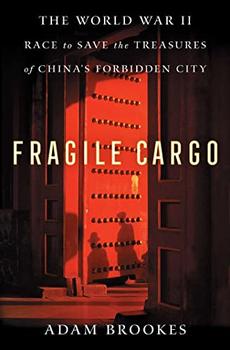Summary | Excerpt | Reviews | Beyond the Book | Readalikes | Genres & Themes | Author Bio

The World War II Race to Save the Treasures of China's Forbidden City
by Adam Brookes
In 1911 Qing troops mutiny, and Chinese nationalists who revile Manchu rule seize their moment. The Qing empire comes to its anticlimactic end, and with it millennia of monarchy. The following year sees the founding of the Republic of China, a delicate, sickly child of a state, afflicted by factionalism, splintered into cliques, and ruled by regional warlords. The last emperor, Qianlong's great-great-great-grandson Pu Yi, remains in the Forbidden City amid a shrunken, faded imperial household, presiding over a court that no longer wields any power. Over the years, the palaces fall into disrepair, yellow tiles tumbling from the pitched roofs, weeds sprouting in the courtyards. The imperial collections, shorn of their traditional meaning, untended in the decaying buildings, are a tempting source of private profit in uncertain times. Princes and eunuchs and palace functionaries quietly make off with works of art to sell in the antiques markets. Pu Yi, who seems to consider the collections his personal property, ships priceless pieces out as financial security.
What will become of the vast holdings of the Qing imperial house—the delicate paintings, sweeping landscapes on silk, intimate studies of birds and children and flowers, portrayals of life in the cities and villages and on the rivers teeming with energy and movement, the fragile carvings in jade and ivory, the ancient libraries of philosophy and philology and science, the scrolls of calligraphy adored by emperors, the robes and furs and tapestries, the snuff bottles and jewels and ornate hairpins of pearl and gemstone worn by the court ladies, the thrones and armor and swords, the significant collection of clocks, the mountains of porcelain, teacups and vases, and ewers and bowls glazed in luminous imperial yellow and startling copper red—in a new, fragile Chinese republic striving to cast off the imperial past and create a modern present?
Nobody knows.
But in the years to come, the imperial collections of China— these hundreds of thousands of irreplaceable objects—will undergo a series of strange, transformative journeys through time and space. They will travel thousands of miles by steamship and bamboo raft, by train and truck, and on the backs of straining, sweating porters, across mountain ranges, up roiling rivers, through burning cities. They will voyage through a war whose scale and savagery staggers the imagination, yet whose course and import is little known or understood in the wider world.
Through it all, the collections' survival will depend upon the labors of a small band of anxious, exhausted museum curators led by a quiet, conscientious scholar of ancient inscriptions, whose unstinting devotion to the task will extract a grievous personal cost. And the imperial collections will undergo too a journey in meaning, as those who care for them—and those who covet them—reimagine them as potent embodiments of a cultural heritage and national ambition that will shape modern China.
Excerpted from Fragile Cargo by Adam Brookes. Copyright © 2023 by Adam Brookes. Excerpted by permission of Atria Books. All rights reserved. No part of this excerpt may be reproduced or reprinted without permission in writing from the publisher.




The fact of knowing how to read is nothing, the whole point is knowing what to read.
Click Here to find out who said this, as well as discovering other famous literary quotes!
Your guide toexceptional books
BookBrowse seeks out and recommends the best in contemporary fiction and nonfiction—books that not only engage and entertain but also deepen our understanding of ourselves and the world around us.